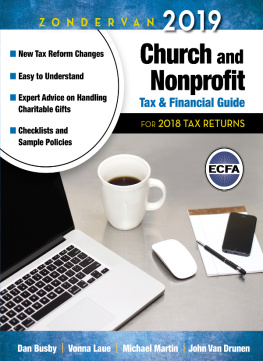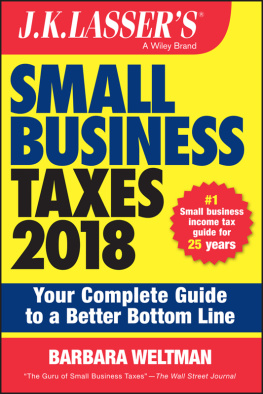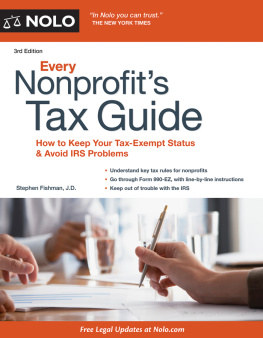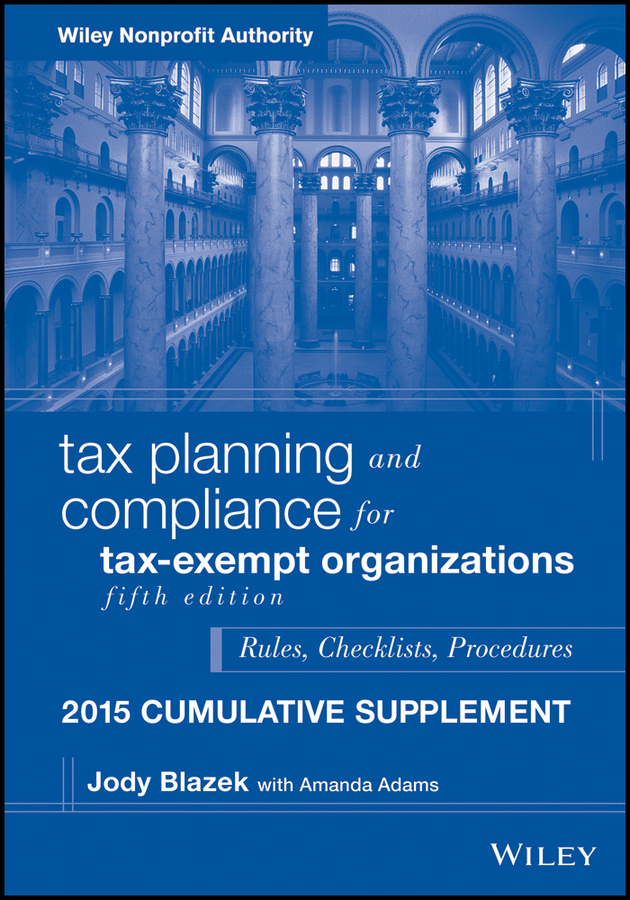Jody Blazek - Tax Planning and Compliance for Tax-Exempt Organizations: Rules, Checklists, Procedures--2015 Cumulative Supplement
Here you can read online Jody Blazek - Tax Planning and Compliance for Tax-Exempt Organizations: Rules, Checklists, Procedures--2015 Cumulative Supplement full text of the book (entire story) in english for free. Download pdf and epub, get meaning, cover and reviews about this ebook. year: 2015, publisher: Wiley, genre: Politics. Description of the work, (preface) as well as reviews are available. Best literature library LitArk.com created for fans of good reading and offers a wide selection of genres:
Romance novel
Science fiction
Adventure
Detective
Science
History
Home and family
Prose
Art
Politics
Computer
Non-fiction
Religion
Business
Children
Humor
Choose a favorite category and find really read worthwhile books. Enjoy immersion in the world of imagination, feel the emotions of the characters or learn something new for yourself, make an fascinating discovery.

- Book:Tax Planning and Compliance for Tax-Exempt Organizations: Rules, Checklists, Procedures--2015 Cumulative Supplement
- Author:
- Publisher:Wiley
- Genre:
- Year:2015
- Rating:3 / 5
- Favourites:Add to favourites
- Your mark:
Tax Planning and Compliance for Tax-Exempt Organizations: Rules, Checklists, Procedures--2015 Cumulative Supplement: summary, description and annotation
We offer to read an annotation, description, summary or preface (depends on what the author of the book "Tax Planning and Compliance for Tax-Exempt Organizations: Rules, Checklists, Procedures--2015 Cumulative Supplement" wrote himself). If you haven't found the necessary information about the book — write in the comments, we will try to find it.
The 2015 Cumulative Supplement to Tax Planning and Compliance for Tax-Exempt Organizations is the latest addition to the indispensable guide to navigating nonprofit tax issues stemming from evolving regulations and IRS procedures. This most recent supplement is packed with checklists and examples that ease the filing process. This new supplement is updated to align with the relevant changes in IRS forms, requirements, and procedures to help you ensure full compliance with the most up-to-date regulations. Clear, concise instructions guide you through important forms and documents, and expert discussion provides insight on specific issues such as unrelated business income, private inurement, affiliations, and employment taxes. Helpful checklists highlight critical concerns, sample documents provide clarification and example, and the nonprofit-specific guidance leads you through obtaining tax exemption, reporting, compliance testing, and lobbying expenditure management.
Nonprofit organizations contend with the possibility of losing their tax-exempt status on a daily basis. Qualification, application, maintenance, and managementevery aspect of that vital status requires a solidly executed strategy for ensuring compliance with federal, state, and local regulations. The 2015 Cumulative Supplement helps you put your strategy into action, with a host of valuable tools and expert guidance on the practical aspect of nonprofit tax planning.
Tax rules and regulations change annually, and nonprofit organizations know that staying compliant means staying up to date. Wading through tax code is less than helpful in the field where clear, practically oriented instruction provides the quick reference accountants, lawyers, and executives need. The 2015 Cumulative Supplement to Tax Planning and Compliance for Tax-Exempt Organizations is the essential, time-saving guide to the latest in nonprofit tax rules, regulations, and procedures.
Jody Blazek: author's other books
Who wrote Tax Planning and Compliance for Tax-Exempt Organizations: Rules, Checklists, Procedures--2015 Cumulative Supplement? Find out the surname, the name of the author of the book and a list of all author's works by series.









